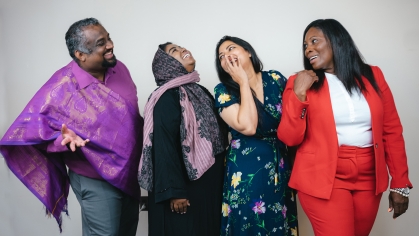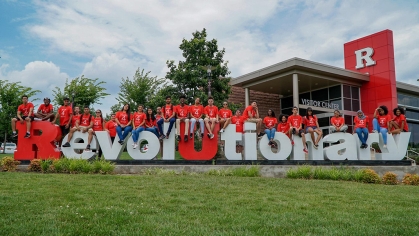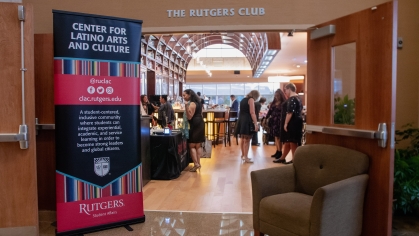Q&A: Cierra Kaler-Jones
A Rutgers University–New Brunswick alumna, Cierra Kaler-Jones is the second woman of color to have secured the title of Miss New Jersey. Using her platform to expand her community program, The Young Artist Empowerment Project, she helped provide culturally relevant arts-based programming to students, specifically girls of color, while examining issues of leadership, goal setting, mental/emotional/physical health, wellness, and social justice.
During her time as an undergraduate student, Kaler-Jones obtained a bachelor’s degree in social work and was the co-founding president of the Rutgers University chapter of She’s the First. Kaler-Jones went on to pursue a master’s degree in education and human development at George Washington University, studying curriculum and instruction for elementary education students. Currently pursuing a doctorate at the University of Maryland–College Park studying minority and urban education, Kaler-Jones’ work examines how arts-based practices can be used as critical tools to encourage student identity development, expression, and activism.
With her writing featured in Education Post, Nia Magazine, Midnight and Indigo, and Ebony.com, Kaler-Jones has been recognized for her social justice work and was a guest speaker at the White House Initiative on Educational Excellence for African Americans and the United States Department of Education.
The Division of Student Affairs recently sat down with Kaler-Jones prior to her return to the banks as a featured speaker for the 2019 Dr. Jewel Plummer Cobb S.T.E.A.M. Women’s Empowerment Conference to talk about her passion for developing arts-based programs, her views on feminism, and the importance of embracing failure
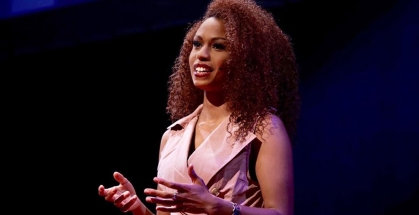
How do you navigate the misconception that comes with beauty pageants?
Growing up I was pretty shy. I didn’t really know how to advocate for myself or for the things I was passionate about. Being put in a position where I had to be in front of a panel of judges, I really had to know my stuff. That empowered me to be [up to date] on current events, and to have an articulate answer to questions that were sometimes difficult. That changed me as a person and has definitely influenced the work I do today.
In terms of feminism and pageants, I always ask the question: what is more empowering than a woman who’s able to share her voice on a larger platform? My personal definition of feminism is being whatever you want. For me that means balancing being sexy, strong, and intelligent in a society that’s constantly telling women they can only be one [of those things]. Competing in pageants taught me that I didn’t have to fit into the mold and that I could become all of those things.
Is there an experience where your engagement with the arts impacted someone?
When I was at Rutgers I served as a Girl Scout troop leader, but for a nontraditional troop. In this troop the parents didn’t have to be involved, they didn’t have to pay dues, the girls didn’t have to sell cookies. It was a gathering space for low income girls of color to come together and was something that Girl Scouts offered to make the experience accessible to communities that wouldn’t otherwise have it. I developed this arts-based curriculum for the students where every week we would do an arts-based activity, and we would talk about an issue that affected our daily lives. We would talk about self-esteem, community service, global awareness, public speaking, different things like that. I saw the girls come into the program and over time watched them grow, develop, and become a lot more confident in their ability to express themselves.
What inspires you?
In addition to going to school, I’m also a dance teacher. I get to educate babies as young as two up through adults about dance and movement. My students come in so excited and ready to learn, and they have so many great ideas that nobody really asks them about. In a lot of conversations I’ve had with them, [they’ll tell me], ‘Miss Cierra, I love coming to dance because you ask us about how our day was. And nobody really ever asked us that.’ How come nobody is asking students or young people to express what’s going on in their lives? That inspires me to continue to do the work even when it’s hard. I think about all the times we’ll be in the dance classroom and you’ll see that light bulb go on. It’s such a triumphant moment, and that enables them to reach their highest potential. That makes me want to be better not for myself, but to be somebody they can look up to.
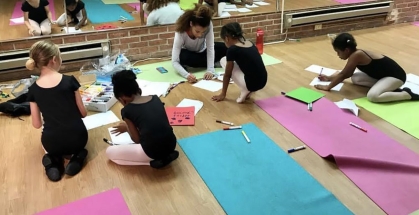
Can you talk about failure vs. the perception of your success?
I fail every single day in some way, shape, or form, but I think that’s where success comes from. People see the glossy headlines, the Instagram posts, and all the things that are beautiful and shiny and wonderful, but they don’t see the hard nights. Being a perfectionist, I really struggle with the stress and the anxiety of feeling like I always have to perform. I’ve come to learn that I have to show myself a lot of grace, especially [as a woman], because the world can be hard on us.
People have high expectations, and we can place higher expectations on ourselves than anyone can ever place on us. It’s really about showing yourself a lot of grace and being vulnerable about your mistakes. I try to be vulnerable even though it’s hard. That’s something that I shied away from for a long time. I thought I had to portray somebody that was perfect all the time, but I don’t and I’m not. Your flaws make you individual and unique. I wouldn’t have the ideas I have or gone after things had I not failed a bunch, but every day I’m trying to one up myself.
The conference’s theme is the future is feminist. What does this mean to you?
When I think about the future as feminist, I think about how women are really at the forefront of standing up for what they believe in, and what they believe to be some of the nation’s most pressing issues. They’re no longer standing on the sidelines or remaining quiet, but being vocal and really pushing for social justice issues. I think that as we continue on, we’ll see more women breaking and shattering the glass ceiling. Women have always been at the forefront of changing and making history, but we haven’t highlighted and amplified their voices in the way we are today. Women will continue to share their stories and continue to be heard. I also think it’s really just a matter of sharing those stories and making them readily accessible for more people.
How did you feel about the culture of women’s empowerment at Rutgers? Did you have a strong woman role model or mentor during your time at Rutgers?
When I was at Rutgers, I was part of Douglass Residential College. I’ll never forget my first semester, we had to take a class called Knowledge and Power: Issues in Women’s Leadership. Before that, I had never been exposed to issues of women’s empowerment. I remember sitting in class and reading the literature about feminism, inequities, and gender [inequality]. People were sharing their personal stories, and I realized I wasn’t alone. Douglass for me was a refuge; a place for me to learn, grow, make mistakes, and be a part of a larger community of women who cared about me. I got involved in a bunch of leadership organizations [at Douglass]. I was head chairwoman of the Orientation Committee and a Red Pine Ambassador. Learning about leadership in a comfortable space was transformative for me. My professor [in Knowledge and Power], Dr. Ashley Koning is a powerhouse woman. She helped us navigate the challenges of being in college, and as the years progressed, she continued to be an incredible mentor for me.
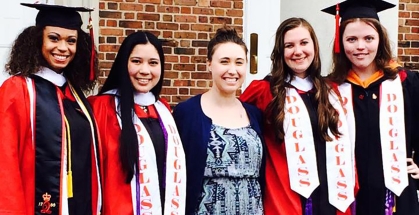
Another mentor for me was Nicole Baron, who was my advisor for the Douglass Orientation Committee, and she went above and beyond for us. I remember when I was a senior and really struggling. I didn’t know what I wanted to do next. She helped me write my personal statement for my master’s programs and to figure out what would be the best fit for me. She went out of her way to ensure I had the resources and tools to be successful.
What do you hope students will take away from the conference?
We need more spaces that promote opportunities for women to come together to share resources and experiences. The more spaces like this we have, the more ideas come out of it. I hope everyone who attends finds that nugget of wisdom that pushes them and propels them to go after what they’ve been thinking about. I know that often when I’m speaking from my personal experiences and conversations with other women, we tend to talk ourselves out of our biggest dreams. I hope this space will [inspire them], even if it’s one person. That’s always my hope when we come into a collective space, to really push for those wildest and craziest dreams. They’re real and valid, and those dreams were put in your heart for a reason. They’re nobody else’s.
For more information about the conference please visit: http://steam.rutgers.edu/
Financial support from alumni, parents, and friends helps us create the innovative learning opportunities that challenge students to be their best at Rutgers and beyond.
About the Division of Student Affairs at Rutgers–New Brunswick
The Division of Student Affairs is committed to facilitating interactions that promote students' success and their personal and professional development. Learn more about our mission.

